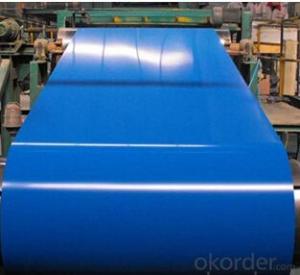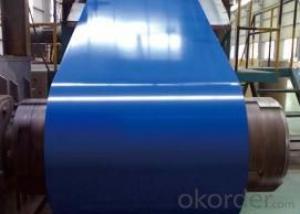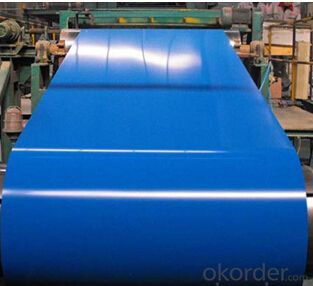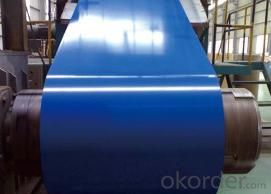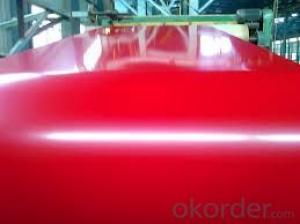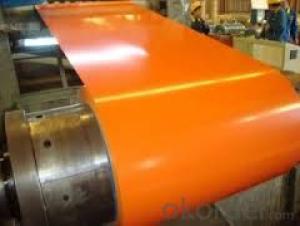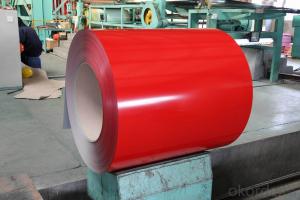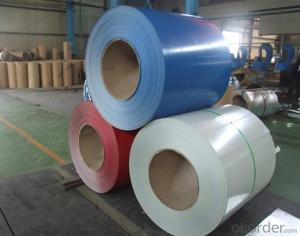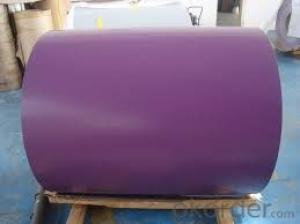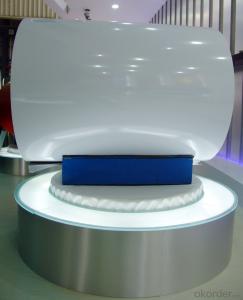PPGI/Prepainted Corrugated Galvanized Steel Roofing Sheet/Color Coated Steel Coil
- Loading Port:
- Tianjin
- Payment Terms:
- TT OR LC
- Min Order Qty:
- 25 m.t.
- Supply Capability:
- 10000 m.t./month
OKorder Service Pledge
OKorder Financial Service
You Might Also Like
Description Info.
Model NO.:CUS-140226-K
Surface Treatment:Coated
Certification:ISO, SGS, BV
Technique:Cold Rolled
Standard:ASTM, JIS, GB, AISI, DIN
Application:Building Materials
Edge:Slit edge
Stock:Stock
Steel Grade:Q235
Color:Ral Colors(Blue,Red,Green etc.,)
Width:600-1250mm
Thickness:0.13-1.5mm
Zinc-Coating:60-275G/M2
Top Paint Layer:18-25um
Export Markets:Global
Additional Info.
Trademark:CUS-STEEL
Packing:Export Packing
Standard:0.13-1.5mm/600-1250mm
Origin:China
HS Code:7210
Production Capacity:150000 Mt/Year
Product Description
PPGI/Prepainted corrugated galvanized steel roofing sheet/Color Coated Steel Coil
Features: Excellent decorative, molding, corrosion resistance, strong coating adhesion, efficient construction, save energy and to prevent pollution and other good economic effect.
Application: Steel structure buildings, household appliance, furniture, transportation and other industries
Advantages of Our Prepainted Galvanized SteelCoil:
1) Excellent corrosion resistance: The zinc layer provides a good protection of Pre-painted Galvanizeed Steel Sheet.
2) High heat resistance: The reflective surface of the material aids in efficiently reflecting the sunlight away and in turn reducing the amount of heat transmitted. The thermal reflectivity converts into energy savings.
3) Aesthetics: Pre-Painted Galvanized steel sheet is available in plethora of patterns and multiple sizes as per the requirements that given by our customers.
4) Versatility: can be used in the various areas.
Applications of Prepainted Galvanized SteelCoil:
1) Buildings and constructions: roofing, ceilings, gutters, venting lines, indoor decorations, window frames, etc.
2) Electrical appliances: computer shells, washing machines, refrigerators, dehumidifiers, video recorders, water heaters, etc.
3) Agricultural equipments: troughs, feeding tools, agricultural driers, irrigation channels, etc.
4) Vehicle parts: back-seat plates of buses and trucks, conveying systems, oil tanks, etc.
Raw material | SGCC, SPCC, DC51D, SGHC,A653 |
Certificate | ISO9001.ISO14001.OHSAS18001 |
Thickness | 0.13mm-1.2mm |
Width | 600mm-1250mm |
Tolerance | thickness+/-0.01mm |
Surface treatment | galvanized / galvalumized steel sheets |
T Bending (top-coating) T Bending (back-coating) | ≤3T ≤4T |
Anti-MEK Wiping | ≥100times |
Zinc coating | 40-275g |
Type of coating process | Front: double coated & double drying Back: double coated & double drying, single-coated & double drying |
Coating types | Top paint: PVDF, HDP, SMP, PE, PU Primer paint: Polyurethane, Exoxy, PE Back paint: exoxy, modified polyester |
Color | customized |
Application | Buildings and constructions, Electrical appliances, Agricultural equipments, Vehicle parts |
FAQ
1.What's your MOQ?
25MT, it is for one container.
2.Do you have QC teams?
Yeah, sure, our QC team is very important, they will keep the quality control for our products.
3. What's your normal delivery time?
Our delivery time about 10-20days for standard sizes, if you have other requirements like hardness and width ,it is about 20-40days. But don't worry ,we also try our best for the delivery time ,because time longer and our cost is higher.
4.Are the products tested before shipping?
Yes, all of our PPGI and GI was qualified before shipping. We test every batch every day
- Q: Are steel coils affected by magnetic fields?
- Yes, steel coils can be affected by magnetic fields. Steel is a ferromagnetic material, which means it can be magnetized or attracted to magnets. When a magnetic field is applied to a steel coil, it can induce a magnetic field within the coil, causing the coil to become magnetized. This can have several effects depending on the strength and duration of the magnetic field. If the magnetic field is strong and the coil is exposed to it for a significant amount of time, it can cause the steel coil to retain some magnetism even after the magnetic field is removed. This can be problematic in certain applications where a non-magnetic material is required, as the magnetized steel coil may attract or interfere with other nearby objects. On the other hand, if the magnetic field is rapidly changing or fluctuating, it can induce electrical currents within the steel coil through electromagnetic induction. These induced currents, known as eddy currents, can generate heat within the coil, leading to energy losses and potential damage to the coil. Therefore, it is important to consider the effects of magnetic fields on steel coils in various applications. Protective measures such as shielding or demagnetizing processes may be necessary to minimize the impact of magnetic fields on steel coils when required.
- Q: I asked a question last week about stainless steel and got some great answers. I combed all over the internet to try to figure this one out but could not find anything. What resists bending better: chrome vanadium steel (i.e. a steel commonly used to make tools) or stainless steel 304. My guess would be the chrome vanadium alloy but thats just a guess. Which on resist's bending better and by how much (#'s please :-)). Also, if anyone knows if chrome vanadium steel is cheaper than stainless steel 304 that would be awesome? I can't find a price per pound on chrome vanadium steel anywhere! Please help. Thanks in advance-Josh
- Steel Bending Strength
- Q: What are the different types of steel coil coatings for heat resistance?
- There are several different types of steel coil coatings that provide heat resistance, including silicone-modified polyester (SMP), polyvinylidene fluoride (PVDF), and high-temperature silicone.
- Q: Can steel coils be coated with color-changing materials?
- Yes, steel coils can be coated with color-changing materials. These materials are typically applied as a topcoat or overcoat on the steel surface, allowing the coils to exhibit different colors or hues based on external factors such as temperature, light, or chemical reactions. This coating technology can provide visual appeal, aesthetic versatility, and even functional benefits to steel coils in various applications.
- Q: How are steel coils processed for edge trimming or conditioning?
- Steel coils are processed for edge trimming or conditioning through a series of steps. First, the steel coils are unwound and fed into a machine that trims the edges to remove any irregularities or imperfections. This process helps ensure that the edges of the steel coils are straight and smooth. After edge trimming, the coils may undergo further conditioning processes such as leveling, slitting, or recoiling, depending on the specific requirements of the end product. These processes help to refine the steel coils and prepare them for various applications in industries such as automotive, construction, or manufacturing.
- Q: What are the main characteristics of steel coils?
- The main characteristics of steel coils include their high strength and durability, flexibility, corrosion resistance, and ability to be easily formed and shaped. They are also known for their uniformity, as they are typically manufactured to precise dimensions and tolerances. Additionally, steel coils have excellent conductivity properties and are commonly used in various industries such as automotive, construction, and manufacturing.
- Q: How are steel coils used in the manufacturing of medical equipment?
- Steel coils are commonly used in the manufacturing of medical equipment as they serve as a crucial component in various applications. These coils are often employed in the construction of medical devices such as surgical instruments, orthopedic implants, and diagnostic equipment. The high strength and durability of steel make it ideal for these purposes, ensuring the longevity and reliability of the medical equipment. Additionally, steel coils are used in the production of medical furniture, such as hospital beds and examination tables, providing stability and support. Overall, steel coils play an essential role in the manufacturing of medical equipment, contributing to the quality and functionality of these devices.
- Q: How are steel coils used in the production of doors and windows?
- Steel coils are used in the production of doors and windows as they provide the raw material for manufacturing the frames and components. The coils are processed and shaped into the desired profiles, which are then used to construct the frames, sashes, and other structural elements of doors and windows. This ensures strength, durability, and stability in the final products.
- Q: They say it's some six times stronger than steel. need some explanation.
- Most importantly, spider silk is extremely lightweight: a strand of spider silk long enough to circle the Earth would weigh less than 500 grams (18 oz). Spider silk is also especially ductile, able to stretch up to 140% of its length without breaking. It can hold its strength below ?40 °C. This gives it a very high toughness (or work to fracture), which equals that of commercial polyaramid (aromatic nylon) filaments, which themselves are benchmarks of modern polymer fiber technology. What this means in regard to what you have heard is that if you compared the tensile strength (type 'tensile strength' on wikipedia if you do not know what it means) of spider silk and a strand of steel at the same thickness, the silk would have a higher tensile strength than many grades of steel, upto that of high grade steel - of which they are about the same.
- Q: How is the quality of steel coils determined?
- The quality of steel coils is determined by various factors such as the chemical composition, mechanical properties, surface finish, and dimensional tolerances. These factors are assessed through rigorous testing and inspections, including chemical analysis, tensile testing, hardness testing, visual inspection, and dimensional measurements. Additionally, industry standards and specifications play a crucial role in determining the quality of steel coils by setting specific requirements that the coils must meet.
Send your message to us
PPGI/Prepainted Corrugated Galvanized Steel Roofing Sheet/Color Coated Steel Coil
- Loading Port:
- Tianjin
- Payment Terms:
- TT OR LC
- Min Order Qty:
- 25 m.t.
- Supply Capability:
- 10000 m.t./month
OKorder Service Pledge
OKorder Financial Service
Similar products
Hot products
Hot Searches
Related keywords
